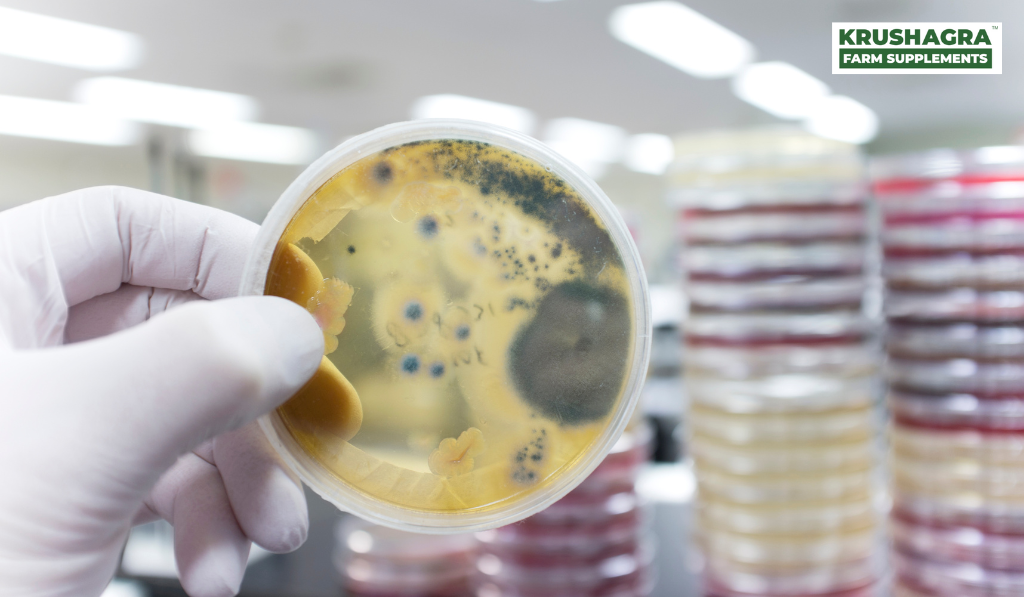Introduction
Since ancient times, medicinal and aromatic plants have been prized for their curative qualities and aromatic components. However, bacterial infections can pose problems for these valuable crops, reducing productivity and jeopardizing the purity of the essential oils and medicinal substances. Environmental and health risks are associated with conventional pest control methods that use chemical pesticides. In this situation, using biopesticides to control bacterial infections in these plants has become a viable and efficient option. This blog explores how biopesticides protect aromatic and medicinal plants from bacterial dangers.
Understanding Bacterial Pathogens in Aromatic and Medicinal Plants
Bacterial infections can inflict severe diseases on aromatic and medicinal plants, which reduces the quantity and quality of important chemicals. These pathogens can impact the growth, development, and general health of the plant by influencing its leaves, stems, roots, and even its flowers. Synthetic pesticides used in traditional control techniques include downsides such as harmful residues, harm to organisms that aren’t the target, and the emergence of resistance. On the other side, biopesticides provide a safer and more environmentally friendly method.
The Benefit of Biopesticides
Biopesticides are organic compounds produced by living things like bacteria, fungi, viruses, and plant extracts. They employ a variety of techniques to fight diseases while reducing their negative effects on the environment. Biopesticides offer a number of significant benefits when it comes to bacterial disease control in aromatic and medicinal plants, including:
- Targeted Action: Biopesticides have a targeted action since they frequently target infections that are quite specific, causing less harm to good insects, pollinators, and other non-target creatures. The ecosystem will be only a little disturbed thanks to its peculiarity.
- Reduced Residue: Unlike chemical pesticides, biopesticides leave the harvested plant material with little to no hazardous residues. The safety and quality of pharmaceutical and aromatic products depend on this.
- Resistance Management: Over time, bacterial pests can become resistant to chemical insecticides. Biopesticides offer a different mechanism of action that can slow the emergence of resistance.
- Environmental Safety: Biopesticides are more environmentally friendly because they degrade naturally and have little effect on the quality of the soil, water, or air.
- Integrated Pest Management (IPM): Biopesticides are a cornerstone of IPM strategies, which focus on combining various pest management tactics for effective and sustainable control.
Prominent Biopesticides for Bacterial Pathogen Control
- Bacillus thuringiensis (Bt): Bt is a well-known biopesticide effective against a wide range of insect pests. However, some strains of Bt also produce proteins with antibacterial properties that can inhibit the growth of bacterial pathogens.
- Pseudomonas spp:Certain strains of Pseudomonas bacteria have shown promise as biopesticides against bacterial pathogens. They produce antimicrobial compounds and compete with harmful bacteria for resources.
- Copper-based Compounds: Copper-based biopesticides have been used for their antimicrobial properties. They are particularly effective against bacterial diseases on plant surfaces.
- Plant Extracts: Extracts from medicinal and aromatic plants themselves can possess antibacterial properties. These extracts can be formulated into biopesticides for pathogen control.
- Phage-Based Biopesticides: Bacteriophages, viruses that infect and kill bacteria, are being explored as targeted biopesticides for bacterial pathogens. They offer specificity and can be tailored to specific pathogens.
Conclusion
The significance of disease-free, superior medicinal and aromatic plants cannot be emphasized, especially as the market for natural and organic products continues to grow. The use of biopesticides offers a possible path toward reaching this objective sustainably. These bio-based methods provide efficient bacterial pathogen management while maintaining the integrity of ecosystems and human health by utilizing the strength of nature’s inherent defenses. The production of medicinal and aromatic plants can flourish as research and innovation in the field of biopesticides develop, giving us the therapeutic and fragrant riches we enjoy without compromising environmental stewardship.






